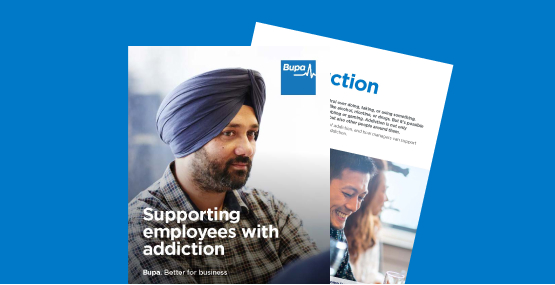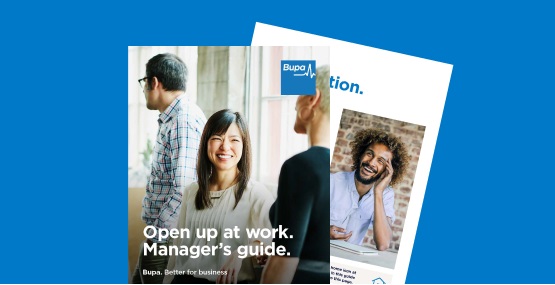Health Horizons
Introducing Health Horizons
We're excited to introduce a new series of virtual events designed to support leaders in your business to anticipate the challenges and opportunities that are shaping the future of workplace health and wellbeing. Health Horizons will replace our existing Health Insights programme.
Bringing together industry experts, innovators, and thought leaders, we'll explore the emerging trends, cutting edge technologies and evolving practices in healthcare.
Tailored for senior leaders, HR professionals and wellbeing benefit managers, attendees will gain unique insights into the transformative landscape of workplace health and wellbeing.
Re-watch the latest live event
Addiction can be an issue for every business, with some estimates suggesting that as many as one in five people in work has a problem with alcohol or drugs, or at risk of developing one.1
Our live event explores the extent of addiction in the UK, what it means for business and the policies and resources that will empower organisations to identify employees who need help, and how to support them.
Read our latest articles from the Health Horizon series

Nurture and nature
Experts now believe the addictive personality is a myth, but there is compelling evidence that both inherited and environmental factors can increase the risk of developing an addiction to a substance or behaviour. Dr Naveen Puri, Medical Director for Bupa UK Insurance explores the complex interplay between genes, childhood experiences and lifestyles which can drive addiction.

Addictive behaviours undermine teams and productivity
Alcohol misuse alone costs the UK economy £7.3billion a year in lost productivity.2 It s a factor in 40% of accidents at work2 and two in five employees have gone to work under the influence of alcohol or impaired by a hangover.2 Learn about the work patterns and practices that can increase this risk and how to ensure the health and safety of teams.

How to provide effective support
Inaction on addiction is not an option, and different forms of addiction will present their own challenges and risks. We explore the core elements of an effective strategy and provide practical advice and tips on the steps organisations can take to support employees who are struggling with addictive behaviours while safeguarding teams and the bottom-line.

Prevention is a strategy for success
The business case for promoting workplace wellbeing is compelling. It’s good for business and it’s good for the wider economy. An ageing population, rising levels of obesity and poor mental health mean health prevention must be a priority for organisations seeking to recruit and retain strong teams.

Disease prevention is getting personal
Genomics has transformed cancer. Screening for BRCA cancer genes has dramatically reduced women’s risk of breast cancer. But we are only beginning to unlock the potential of polygenic health screening which can provide personalised health and lifestyle advice based on individual risk. Learn more about what is happening now, and what lies ahead.

Creating a healthy culture
Employee wellbeing priorities must be integrated throughout an organisation, embedded in its culture, leadership and people management. Discover what it takes to develop, and maintain, workplace wellbeing initiatives that are tailored to the needs of your teams.

A healthy environment is good for business
Prioritising sustainability is crucial for employee engagement and retention. The latest Bupa Wellbeing Index shows 45% of employees believe the opportunity to propose eco-friendly initiatives would boost their motivation.3 This rises to 56% for Gen Z.3 Discover how your business can be part of the climate-crisis solution

Digital delivers climate dividends
Advancing digital transformation will be key as we tackle the climate emergency. Remote consultations, innovation and smart tech can all improve access to healthcare. This is while reducing carbon emissions and other environmental burdens. Explore the innovations which will protect the health of our planet and people.

Creating a climate for change
“We need to move away from the traditional ‘make-use-dispose’ economic model,” says Dr Robin Clark, Medical Director of Bupa UK. Innovations applied at our Cromwell Hospital show how sustainability can save costs and the environment. Learn how collaboration across sectors, and Bupa’s eco-Disruptive partners, are driving change.

Tackling the crisis in men's mental health
Men are at much higher risk of poor mental health than women.4, 5 But, traditional views of masculinity often prevent them from seeking help when they are experiencing problems.6 Learn how to meet this challenge and discover how one firm in a male-dominated industry is making a difference.

Investing in mental health is a priority
Analysis shows that supporting mental health and wellbeing in the workplace can increase productivity by up to 12%.7 Also, every £1 invested will deliver a return of £5.8 Discover what makes an effective workplace programme in our article. We'll also give you the tools and resources to signpost to support emotional wellbeing across your teams.

Upskill managers to support mental health
Line-managers are at the frontline when it comes to providing mental health support. But, 46% are considering quitting because of their own struggles with work-related stress.9 We explore how to support these key employees with core standards that aim to embed positive policies and good practice.

Women’s health in the workplace
Women now make up 48% of the workforce,10 menopausal women are the fastest growing demographic in the workplace,11 and employment lawyers have flagged women’s health as a hot topic for 2023.12 Offering the right support will give organisations an edge in the competition for talent says, Bupa’s Clinical Lead for Women's Health Dr Samantha Wild.

Age diversity dividends
Almost three quarters of employers are actively trying to recruit older talent.13 And the CIPD says building age-diverse teams helps to address skills and labour shortages. As the risk of health problems increases and evolves with age, in this article we explore how providing the right healthcare support will enhance recruitment and retain talent.

Addressing disability in the workplace
A third of disabled employees don’t request reasonable adjustments for fear of being treated differently, yet 80% say they are more productive, and happier, when adjustments are made.14 Learn how to support the needs of team members with different disabilities by asking questions and encouraging open communication.

Digital mental healthcare solutions
With demand for mental health support continuing to rise, AI and digital platforms provide a unique opportunity to reshape the way we deliver care. We look at the way innovative platforms such as SilverCloud, JAAQ and Bupa Blua Health empower users to make positive changes and access support.

What is quiet quitting?
Quiet quitting has been the buzzword in 2022, but what does it mean, and what does it mean for your teams? We explore how this generational shift in attitudes to work is part of a bigger challenge around engagement - and the steps you can take to address it

Financial uncertainty
Money worries can increase the risk of poor mental health and 80% of employees say stress around personal finances impacts their performance at work15. Learn how businesses can support teams and the dividends this delivers in productivity and employee retention.

Diversity: dividends and challenges
The business benefits of diversity are well documented. 47% of employers struggle to fill vacancies.16 Seeking out a more diverse workforce will be vital in the challenge to recruit and retain talent. We explore existing health inequalities and the value that the right healthcare packages deliver.

Neurodiversity: strategic thinking
There are unique advantages to having a brain that works differently. That’s why progressive organisations are recruiting neurodiverse staff with specific strengths. This can include problem-solving and pattern recognition. We look at how to attract and support neurodivergent talent.

Inclusivity: creating thriving workplaces
Building a diverse and inclusive workplace is good for business. It also delivers benefits for all staff.17 But, this can mean addressing barriers and unconscious discrimination. We unpick these challenges and provide a roadmap of strategies and initiatives. This helps organisations create a more inclusive workplace.
What's on the Horizon for 2024
Secure your place at one of our upcoming virtual events

Fertility: shaping inclusive workplace cultures
May 2024

Unlocking the potential of a multigenerational workforce
September 2024

Proactive and preventative health
November 2024
Resources from the Workplace Health and Wellbeing Academy

Managers guide: Addiction

Managers guide: Mental health in the workplace
Watch our latest Academy module
Watch the latest bitesize Academy module: Supporting stress in the workplace. Our experts share tools and advice on how line managers can prevent and manage work-related stress so their employees come to work feeling healthy, happy and motivated.
Supporting employees with work-related stressVisit the Workplace Health and Wellbeing Academy page for more information.
Workplace Health and Wellbeing AcademyHi everyone, and welcome to this Bitesize Academy module.
My name is Emma Shatliff, manager of the Bupa Academy.
In this session will be discussing the role line managers can play to support work related stress.
And for that conversation, I'm delighted to be joined by Dr.
Naomi Humber, head of Mental Wellbeing at Bupa.
Thanks for joining me today, Naomi.
Thanks.
It's nice to be here.
Research shows that work related stress continues to be one of the main causes of short and long term absence in the UK.
So please, could you start by explaining some of the causes of work related stress?
So a certain amount of stress can be really positive for us.
It can allow us to perform at our best, it can increase our motivation, it can increase our focus on tasks, and it can generally help us to cope with work demands.
However, work related stress is more about typically associations with negative impacts of our working environment or our approach to it, which has impacted on our physical and mental health.
So we are finding we are stressed by our working life in some way and it's impactful towards us.
A member of your team may feel stressed if they feel the demands that are placed upon them feel overwhelming, they feel excessive, their targets and the deadlines that you've set them feel unrealistic to them.
It may be that they are struggling because they don't feel supported within the working environment.
It might be by yourself as a line manager.
It might be difficult relationships potentially with their team-mates it could be that they are not feeling in control of their working day and they don't have enough autonomy or say in what's going on day to day.
It could be that they don't feel as engaged in change processes as much as they want to be.
So the why?
Why are we doing this and what does that mean for me?
Change happens a lot in organisations and if we're not engaged in that process, we can start to feel unnecessarily the impact of stress and unease about what's happening.
They may not fully understand their roles and their function, so there's a lack of clarity around that and that uncertainty creates a stress for them.
People are stressed in the workplace in different ways for different reasons, so all of those things might not apply to someone, it’s good that we check in with people and understand what is difficult for them.
What we find is people can respond and react to stress because of their age, their ability, their competence, their experience.
There can be a range of different reasons why people respond differently to stress and stresses within the workplace, and it's really important that we understand that everyone manifests differently in regards to stress, too.
So it's important that we check in as much as we can with people.
Thank you.
So in a nutshell, there's quite a lot of causes of work related stress that managers need to be aware of.
So we know signs of work related stress can vary depending on someone's personality and how a person responds to pressure.
So what signs should managers look out for in their teams?
So I think it's really important to get to know your team very well and you'll know then how they usually turn up to work and then what might shift for them, what might change in terms of their presentation.
It may be their behaviour, their performance in work, their relationships with colleagues, the way they're communicating with people, what typically some common things we will see is changes in appearance, so people become dishevelled or neglectful of themselves and the way they they turn up to work, it might be they are underperforming in some way.
So you've set them some tasks and they're not getting them to you on time.
It might be not meeting deadlines/targets.
It might be that there work is considered underpar.
It may be that they are struggling with their confidence, their motivation, their commitment to things.
It could be emotionally being very reactive to things.
It might be very anxious about something very irritable or quite the opposite and quiet and reserved, less than usual.
So there's a range of different things that people might present like when they are struggling with stress.
I think if you think of a line manager, potentially you've got a number of team members who are all very different individuals.
Is it okay for a line manager to have an upfront conversation with somebody when they maybe join the team in the first instance to say, you know, if you were struggling or you were feeling stressed, what might that look look like for you?
And if I notice some of those symptoms arise in, am I okay to have that conversation with you?
Because sometimes I'm guessing the individual might not recognise it in themselves.
Is that okay?
Yeah, I definitely believe that.
I think it's important to get to know your employee and get to know them when they're feeling well and things are okay for them.
That's almost the baseline of the person.
And then when you start to notice a change in them, you can, you can bring it to their attention and just sensitively broach the subject.
I think that we don't want to wait until someone is feeling stressed and telling you they’re stressed.
We want to pick up on that a lot sooner, so let's not wait for it.
Let's try and pick up on the early signs and, you know, help them as much as possible because it's likely that they're being impacted from a physical and mental health perspective, but also from a productivity perspective too.
That’s great, thank you.
Around 18 million working days are thought to be lost each year because of work related stress, anxiety or depression.
What are some of the other ways work related stress can impact on the workplace?
As we've discussed, stress can place immense demands on an employee so it can affect their physical and mental health.
It can affect their behaviour, their performance, their relationships with their colleagues.
And high levels of stress within an organisation has great detrimental effect to an entire business.
It can be about presenteeism, so people are reducing in their productivity.
It can be about absenteeism, a high staff turnover and reduced staff engagement.
So that can all impact the bottom line in some way.
It's important that organisations realise how serious it can be when work related stress goes across an entire business and it can happen very quickly and it has a bit of a ripple effect.
So we have an employee who is struggling with work related stress and then impacts on the team members around them and then it becomes a team issue, then it becomes a manager issue and then that team impacts on another team.
And then before we know it, the teams that are there to support these employees, such as the HR team or the occupational health team, are feeling quite burnt out by the level of stress and potentially mental health problems in the business.
So it can really have a big, big impact on a business.
And when a workplace could be considered toxic from a stress perspective and people are struggling and they're not being helped in terms of support for that stress, word of mouth goes a long way in bad PR.
So if people talk about how stressed they are in work, you know, it's a small world in certain industries and sectors, so you won't retain talent and you won't recruit it.
So that will hit the bottom line.
I think a lot of line managers will find that information really useful, so thank you.
And onto line managers, they obviously play a crucial role in helping to prevent and manage work related stress.
What are some different ways that you can support an employee who might be struggling with stress?
So there's a range of different ways that line managers can approach this situation.
It can be about creating clear roles and responsibilities for the person, ensuring that you've had an open and honest conversation about their workload and what feels fair and realistic for them in terms of, for example, targets and deadlines, considering the work life balance and making sure that you reminding them of breaks and holidays and taking them when they can, having a really supportive work environment between yourself and that employee, but also within the team and within the wider business as much as you can do checking in with your direct reports about how they're getting on, if they need any source of support, making sure that you signpost them accordingly, making sure that they are equipped to deal with the job that they've got to do.
So it might be the right sort of equipment, the right training in place, the right coaching that they've mentioned, making sure that you empower them to make the decisions about their working life as well.
So they feel very much in the driving seat at times in control, maybe selecting different projects that they'd like to get involved in or prioritising as they see fit.
Thank you.
And lastly, what advice would you give to managers on how to support an employee returning to work after stress leave?
I think this is a really important one and it's one that I hear quite a bit as a clinician in mental health.
So you've got to be very sensitive about the nature of the reason for sickness absence, which is work related.
So if we think about that, when you go off work and you come back into work after a period where you've recognised that work has been a trigger for you, it's it's been something that has led to you having a period of sickness, it can be very difficult to return to that working environment and not be triggered in some way.
It could be relationships with colleagues, it could be particular meetings, certain roles and responsibilities that you have.
So as a line manager, really recognising that that that might be quite a challenging situation to return to.
Thinking about, then easing them back into that situation, having a regular check in with them.
One of the biggest things I hear as a mental health clinician is someone says, “No one ever asked me how I am.
No one ever said how are you?
” And that is really significant for me as a mental health clinician, because it's a very simple and straightforward question, but it doesn't get asked a lot, particularly with regards to work related stress.
And it goes a long way for someone.
Another thing you find is that people's confidence is dented, so they've gone off and they come back and their confidence has took a bit of a knock and it's about validating them.
You know, you've taken the time to get better.
That's really important.
We’re so pleased you did that and that's lets them recognise them as an individual within the company and value them.
Compliments and positive reinforcement go a long way with us all.
We all love to hear a positive about ourselves and it boosts someone's coping and work adjustment.
So if you can say great job, well done, that was a brilliant piece of work that will really help them to embed back into the business.
Thank you so much for joining me today, Naomi.
I think the tips and advice that you've given will be really helpful for our line managers watching this.
So thank you.
Thank you.
Follow our LinkedIn page
Bringing the latest news and updates directly to your news feed, in real time. We want to hear from you directly, so we encourage you to like, share, comment and ask us questions.
1 European Monitoring Centre for Drugs and Drug Addiction, 2022
2 Institute of Alcohol Studies, 2020. (PDF, 0.6MB)
3 Bupa, 2023. (PDF, 1.7MB)
4 Office for National Statistics, 2022.
5 Office for National Statistics, 2021.
6 Women and Equalities Committee, 2019. (PDF, 0.2MB)
7 Mental Health Foundation, date unknown.
8 Deloitte, 2020.
9 UKG, 2023.
10 Resolution Foundation, 2021.
11 Department for Work & Pensions, 2015. (PDF, 0.3MB)
12 Keystone Law, 2023.
11 HR Magazine, 2023
12 YouGov, 2020.
13 HR Magazine, 2022
14 YouGov, 2020
15Yulife, 2022.
16 CIPD, 2022. (PDF, 0.6MB)
17 McKinsey & Company, 2020.
18 Centers for Disease Control and Prevention, 2022.
19 Commission on Health and Prosperity (PDF, 1.6MB), 2023
Bupa health insurance is provided by Bupa Insurance Limited. Registered in England and Wales No. 3956433. Bupa Insurance Limited is authorised by the Prudential Regulation Authority and regulated by the Financial Conduct Authority and the Prudential Regulation Authority. Arranged and administered by Bupa Insurance Services Limited, which is authorised and regulated by the Financial Conduct Authority. Registered in England and Wales No. 3829851. Registered office: 1 Angel Court, London EC2R 7HJ
Bupa Health Trusts are administered by Bupa Insurance Services Limited. Registered in England and Wales No. 3829851. Registered office: 1 Angel Court, London EC2R 7HJ © Bupa 2024